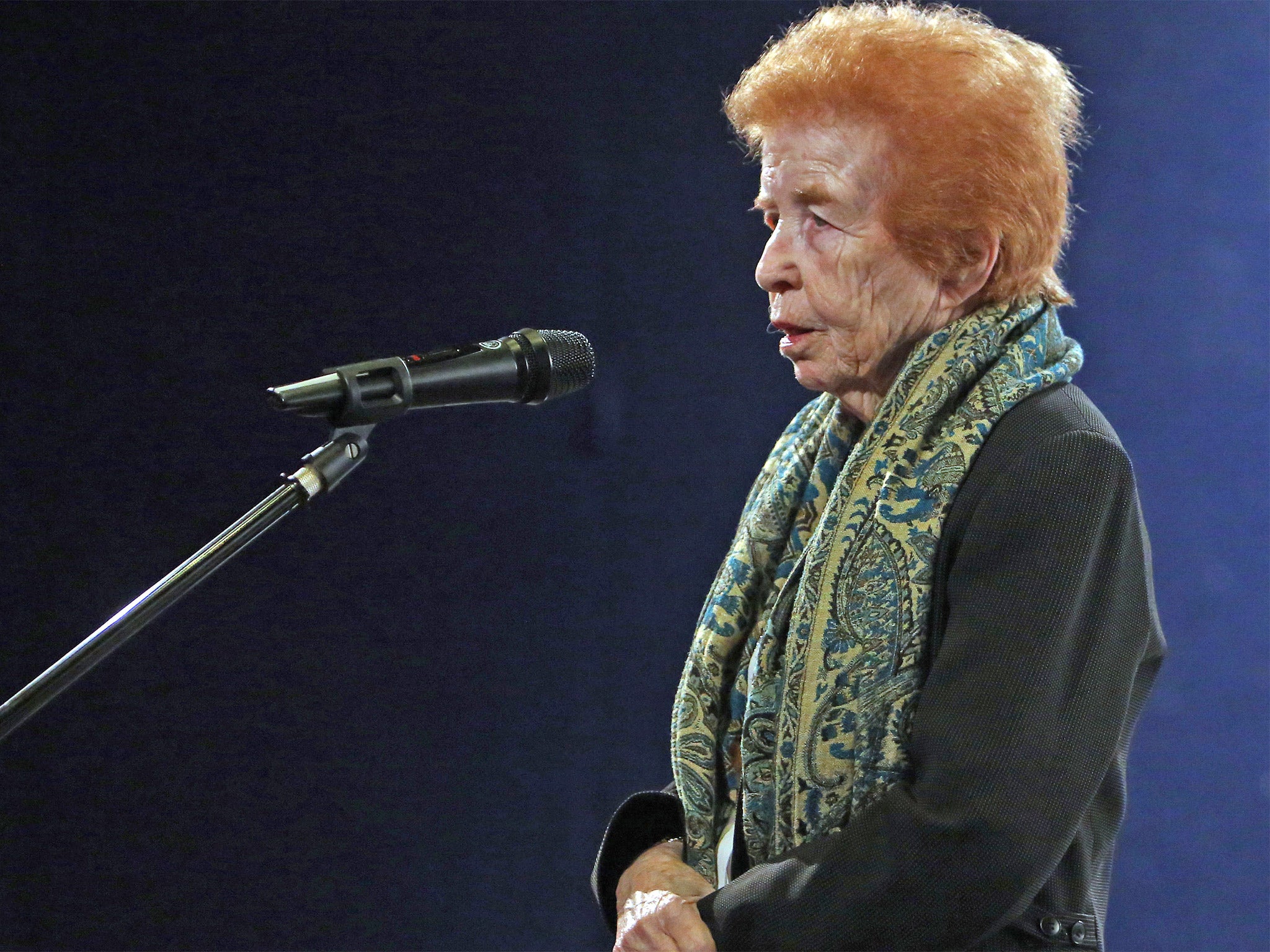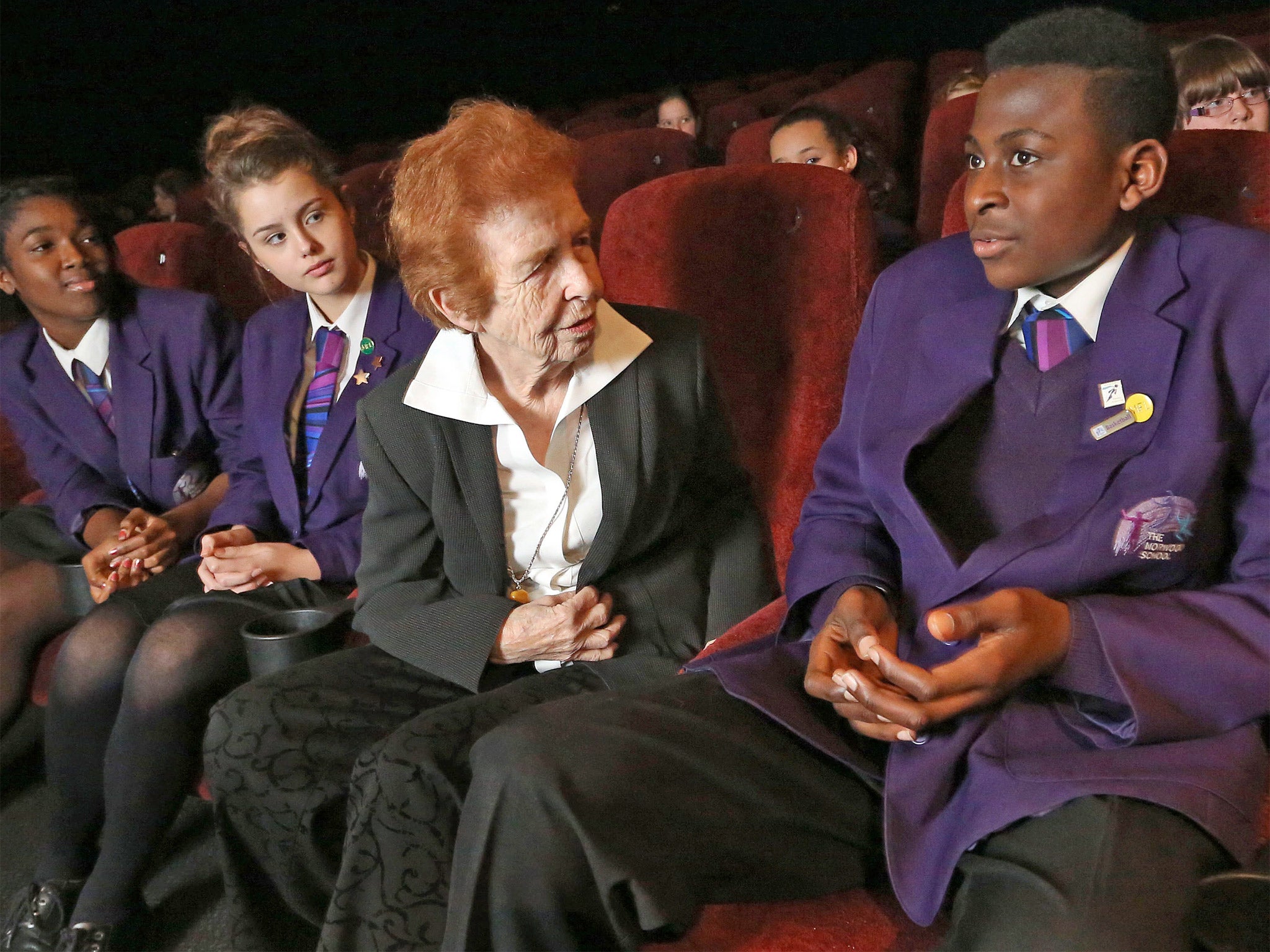A living history lesson: Holocaust survivor Eve Kugler talks to pupils around the country prior to Holocaust Memorial Day
She tells Richard Garner about the importance of remembering

Your support helps us to tell the story
From reproductive rights to climate change to Big Tech, The Independent is on the ground when the story is developing. Whether it's investigating the financials of Elon Musk's pro-Trump PAC or producing our latest documentary, 'The A Word', which shines a light on the American women fighting for reproductive rights, we know how important it is to parse out the facts from the messaging.
At such a critical moment in US history, we need reporters on the ground. Your donation allows us to keep sending journalists to speak to both sides of the story.
The Independent is trusted by Americans across the entire political spectrum. And unlike many other quality news outlets, we choose not to lock Americans out of our reporting and analysis with paywalls. We believe quality journalism should be available to everyone, paid for by those who can afford it.
Your support makes all the difference."My experience during the Holocaust wasn't as horrendous as what you have seen," says 83-year-old Eve Kugler as she begins to speak.
She is at a cinema in Clapham, south-west London, to talk to secondary-school pupils who have assembled to hear first-hand accounts of the persecution of the Jews under Hitler. The pupils had just watched Hide and Seek, a 50-minute film about Jews' experiences during the Holocaust and how they had been forced to go into hiding to escape being sent to the death camps. They had heard the tale of one mother who had been given an ultimatum to kill her baby or leave the hideout for fear that the Nazis would hear the infant's crying and wreak even more terror on the people assembled there. She chose to smother her baby. Then there were the children who grew up in the sewers with rats as daily companions as they hid away.
Kugler herself is a Holocaust survivor. After speaking for nearly 50 minutes, she is asked by one pupil how many family members she had lost during Hitler's time in power. "Both my grandfathers, two uncles, five aunts and I don't know how many cousins," she replies.
Maybe it is not as horrendous as some of the stories in the documentary but it is pretty harrowing nevertheless, as the reaction of the pupils who have listened to her indicates. Kugler is one of the Holocaust survivors still going into schools to relate what happened to them. She has been doing it "for eight or nine years" now and does two or three visits in the run-up to Holocaust Memorial Day – which takes place next Tuesday.
The Holocaust Memorial Day Trust, which is organising a series of talks and film screenings in conjunction with Picturehouse Cinemas up and down the country, believes that the programme is essential to bring home the horror of the Holocaust to avoid such a genocide ever being repeated.
As Kugler says after her talk: "I do hope that they will remember what they heard and saw here and that they will talk about it with their friends. I would like them to understand that people are people and there is no reason why one group, because they look different or have a different religion, should be treated in this way. People are people – it sounds trite but that's essentially what the message is."
The pupils – the day I visited they were from two secondary schools in south London, Norwood and Wimbledon College – have been studying the Holocaust as part of the history national curriculum. But, as Joseph Kuranga, a 14-year-old at The Norwood School, says: "I would say that from today I have seen it from the point of view of those who experienced it. It makes for a greater understanding of it – more than I would get in a history lesson. It's like you've almost lived it." Kugler did live it, of course. She told how she had been born in Germany two years before Hitler came to power and that her father had been running a small department store. "In the six years after Hitler came to power, there was a very slow limiting of the lives of the Jewish people," she says.
She can recall her mother walking down the street with a line of Nazis in the middle of the road. "If she didn't raise her arm and shout 'Heil Hitler', she would be arrested," she says. She also remembers her mother being terrified one day as a Nazi picked Eve up and started swinging her about. "I was fair, blue-eyed and [she begins to blush] pretty," she says. "You may be congratulated for having such a beautiful Arian child," he told her mother.
His mistake meant she was safe. Her father tried to get a visa to go to Palestine, made it on to the waiting list and "crept up it – but they wanted people with skills like construction, plumbing, doctors as a priority". A younger sister, Lea, was born in 1936 and delivered at home after the Nazis had decreed that no Jewish woman could have access to hospital facilities to give birth.
Her father's business then started to ebb away. "Some people were afraid to go into a Jewish store and some people didn't want to do business in a Jewish store," she says.

It was in 1938 that her grandfather became the first victim in their family as the Nazis arrived and took him away to a concentration camp. Ten days later, they came back in the middle of the night and took her father, too. That night – the infamous purge of Jews on Kristallnacht – the store was smashed up, leaving broken grass everywhere. Her mother spent the following day clearing it up on the orders of the Nazis. "Throughout that night there had been a frenzy of destruction of Jewish businesses," Kugler says.
Her father was taken to a concentration camp and was told: "If you want to get out, get a visa." It was impossible but her mother was able to find a forger to help her devise one. The first attempt was torn up and thrown away by the Nazis but the second visa was successful – largely because it was accompanied by a sum of money. Eventually the family fled to France and, after the Nazis invaded, Kugler and her elder sister, Ruth, were evacuated to the United States where they lived with a succession of foster parents.
"Lea became a hidden child – in 1942, there was a major round-up of all the Jews in France," Kugler says. "Lea, who by then was five-and-a-half years old, was taken away by an ambulance – the Germans accepted ambulances were still needed [so it was not checked]." She was forced to hide in the fields when the Germans arrived at the farmhouse in which she had taken refuge.
The family met up again in the U.S. after the war. "It took five weeks for my parents to be reunited with Lea because she was so well hidden," says Kugler.
She says the legacy of Hitler's dictatorship "left me with a feeling that I had to be good and that I had not to make trouble". "I also felt and did feel for a long time and still feel today that I have to live for the children who perished," she adds. The film has already explained to the pupils that, of the 1.6 million Jewish children in western Europe before the Holocaust, only 10 per cent survived. "We were very fortunate in that we were one of the very few nuclear families where all survived [both parents and three children]" says Kugler.
Nevertheless, she admits to being uncomfortable visiting Germany even now.
When the talk is at an end, the pupils are left to ponder what they have heard. "You know in school, you get things from books," says Rosie Curran-Crawley, also from The Norwood School. "When Eve was talking, you got the real story."
Her classmate, Victoria Taowi, says: "It was almost like a history lesson brought to life. You hear stories in class and you don't really understand them – it gives you a different outlook on the situation."
Victoria adds: "The story about the kids living in the sewers was really horrible to me. It must have been horrible. No one would want to live like that."
Another pupil recoils as he remembers the harrowing story of the Jewish mother who smothered her baby. He is full of sympathy for the mother's plight.
Kugler – and the dwindling band of Holocaust survivors who have been visiting schools in the run-up to Holocaust Memorial Day – have played their part in bringing a horrific period of history home to the pupils of today, a history that the Trust's website makes clear has since been repeated in Cambodia, Rwanda and Bosnia.
It is up to the pupils now not to forget what they have been told. Those who witnessed Eve Kugler's talk are sure they will not.
To find out more about the Holocaust Memorial Day Trust, visit hmd.org.uk